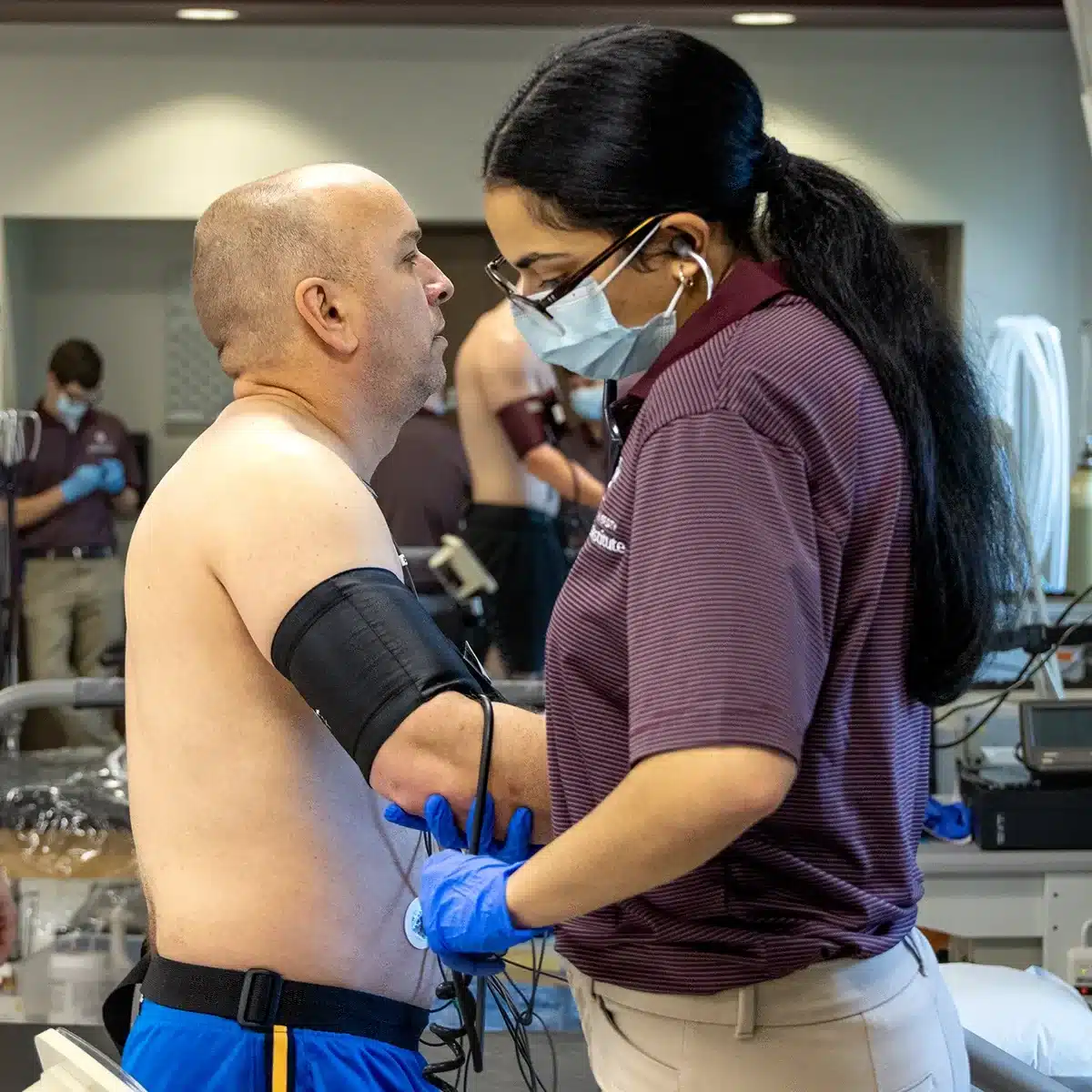KNSM Labs & Institutes
Biology of Physical Activity Laboratory
Division: Kinesiology
BPA determines the biological and genetic pathways that regulate physical activity in humans. The lab uses both human and mouse models in both genetic and proteomic investigations.
Center for Sport Management Research and Education
Division: Sport Management
The Center for Sport Management Research and Education is designed to be a catalyst in bringing together an interdisciplinary team of researchers in the study of sport and athletics management, and generate and diffuse timely and appropriate knowledge concerning the practice and application of sport and athletics management.
Center for Translational Research in Aging and Longevity
Division: Kinesiology
The Center for Translational Research in Aging and Longevity (CTRAL) is engaged in ongoing translational research on nutrition, exercise and metabolism in relation to aging and the common diseases of our aging population. Translation of knowledge from basic and applied sciences to care and clinical practice for older adults is the overall goal of our group.
Coaching Academy
The Coaching Academy helps individuals reach their goals related to the variety of opportunities the coaching field provides. Educational experiences are provided to assist students, student-athletes and current coaches to achieve their career objectives, as they positively influence those they coach, and the communities in which they interact.
Learn about Coaching AcademyCollege Sports Lab
Division: Sport Management
The primary mission of the College Sports Lab is to advance and further develop the management of the intercollegiate athletics community through scholarly inquiry, valuable experience, and application of knowledge.
Exercise & Sport Nutrition Laboratory
Division: Kinesiology
The Exercise & Sports Nutrition Lab (ESNL) evaluates the interaction between exercise and nutrition on health, disease and human performance. The lab’s mission is to help disseminate research findings to the scientific and lay communities through research presentations, publications, media interviews and individual and group counseling.
Exercise Genetics Laboratory
Division: Kinesiology
The Exercise Genetics Laboratory identifies biological mediators of adaptions to exercise training and elucidates the mechanistic basis for chronic disease associated with low levels of fitness. The lab uses the genetic/genomic approaches, quantitative trait (QTL) mapping and haplotype analysis, to investigate the genetic basis for individual variation in response to exercise training.
Huffines Institute for Sports Medicine
Division: Kinesiology
With a $2.5 million endowment, the mission of the Sydney and J.L. Huffines Institute for Sports Medicine and Human Performance is threefold: to facilitate cutting-edge research in Sports Medicine, to contribute to better practice and development in Sports Medicine, and to help the public understand the science behind sports medicine and human performance.
Muscle Biology Laboratory
Division: Kinesiology
The focus of MBL is to better understand the fundamental mechanisms controlling skeletal muscle protein homeostasis. Current studies focus on alterations of muscle protein synthesis and degradation with advancing age, after exercise and during periods of stimulated microgravity or disuse.
Learn about the Muscle Biology LabNeuromuscular Coordination Laboratory
Division: Kinesiology
The Neuromuscular Coordination Laboratory aims to understand the behavioral and neuromuscular constraints involved in the control of human movement in healthy individuals and clinical populations.
Redox Biology & Cell Signaling Laboratory
Division: Kinesiology
The RBCSL is dedicated to investigating the role of pro-oxidants in normal skeletal muscle function as well as skeletal muscle dysfunction with physical inactivity and disease. The goals of the lab are (a) to reduce the human suffering and increase the quality of life of Texans and Americans afflicted by skeletal muscle wasting with heart disease, muscular dystrophy, etc. and (b) to substantially reduce the risk and incidence of modern chronic disease by improving the function and antioxidant state of skeletal muscle.
Visit the RBCSLSpace Life Sciences Graduate Training Program
Division: Kinesiology
The goal of SLS is to develop a cadre of scientists capable of performing the work necessary to solve the most critical problems in space life sciences that limit long duration space flight such as:
- Bone loss
- Muscle wasting
- Health effects of cosmic radiation
- Changes in metabolism
- The consequences of being in a catabolic state while in space
In addition, students will gain the specific training in either nutritional and/or exercise physiology countermeasures against these major biological problems.
Vascular Biology Laboratory
Division: Kinesiology
The Vascular Biology Laboratory (VBL) focuses on the interactive effects of aging and exercise training on skeletal muscle vascular beds. The lab’s mission is to understand how the structure and function of arteries change with age and how these changes increase cardiovascular disease risk in the elderly. In addition, we are determining mechanisms by which exercise training attenuates, or reverses, the detrimental effects of aging on vascular function.


